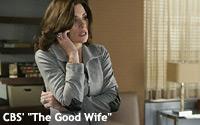
I can
say without reservation that this Sunday's episode of CBS' “The Good Wife” is the most exciting hour of drama anyone will see on broadcast television this season. It is certainly the
strongest broadcast hour of 2013 to date -- and no, I haven't forgotten the most moving episodes earlier this year of NBC's “Parenthood,” with its harrowing and heartfelt arc about one
character's heroic struggle with cancer and the impact it had on her loved ones. “Parenthood” may have touched me, but “The Good Wife” has knocked me flat.
It is also the
strongest episode in the five-year history of “The Good Wife,” which is saying a lot, given the unwavering quality of that show since it began. There are reasons why it is often the only
broadcast series grouped by critics into the company of television's finest dramas, the rest of which happen to be on basic and pay cable.
advertisement
advertisement
In fact, speaking of pay cable, I would say that this
episode of “The Good Wife” calls to mind the season-four finale of HBO's modern-drama standard-bearer “The Sopranos.” That was the episode in which Tony and Carmela’s
marriage exploded -- a plot development that had been building throughout that season, and even before, as Carmela became increasingly aware of her husband's many infidelities. Remember that
blistering confrontation between Tony and Carmela? At one point it seemed as though Tony was going to cross a line he had never even approached and hit Carmela, but he instead punched a hole in the
wall next to her head. It was one of the most powerful moments in the history of television.
Nothing in this episode of “The Good Wife” gets quite that intense, but it comes close
in different emotional and psychological ways, both for the characters and for longtime viewers invested in them. That's the greatest thing about television, isn't it? The way a well-done comedy or
drama draws people in, becomes a part of their lives and establishes long-term emotional connections with them?
Those of us who were fully invested in “The Sopranos” felt like we
were right there in the room when Tony and Carmela were screaming at each other. To this day I recall not simply feeling that I was standing next to them, but that they were draining the air out of
the room and I had to think about breathing. There are scenes in this Sunday's episode of “The Good Wife” that are not far from that in their raw power. They tear at viewers' established
emotional connections and their comfort with certain assumptions about the characters in ways I have never seen a broadcast drama do before.
One caveat: This Sunday's episode, which amounts to
a series of personal and professional showdowns among characters that have largely been working together as a team from the beginning, but are now splintering apart in powerful and often ugly ways,
probably won't seem like anything special to people who haven't been following the show. There will undoubtedly be a lot of press tomorrow and Sunday calling attention to the episode, and that may
tempt people who are not familiar with it to tune in. It wouldn't surprise me if they were somewhat underwhelmed, given the heightened expectations surrounding it, unless they are content simply to
appreciate some of the finest acting on display in any television series, powered by one of the medium's most talented ensembles and a roster of recurring guest stars unmatched anywhere else in the
medium. Then they will be good.
It's no secret that a major story line on “The Good Wife” this season involves a small group of attorneys at Lockhart/Gardner quietly planning to
break away and start their own firm, taking a handful of L/G clients with them. The tension generated by this plot line has been palpable since the season began, as has the knowledge that when the
time came for the group to actually leave, the you-know-what would fly in all directions (hence the title of the episode, “Hitting the Fan”). That's exactly what happens right from the
opening sequence and it never lets up, making for what can only be described as the kind of breathtaking, pulse-pounding drama broadcast television networks will need if they are to survive and thrive
in the new media world.
Series creators and executive producers Robert King and Michelle King, who wrote the episode, spread the collateral damage to every corner of their canvas, giving every
single character new challenges for however many more years “The Good Wife” happens to run. In particular, the characters played by Josh Charles, Christine Baranski, Chris Noth and Zach
Grenier -- already four of the show's most vital and dynamic individuals -- are even further galvanized. Series lead Julianna Margulies, who has nothing to prove to anybody, shows us once again that
she can carry the weight of intense adult drama with the best of them.
Certainly, “The Good Wife” is not the only drama in the history of broadcast television that has delivered on
so many levels. But it is the only broadcast drama that is doing so right now. Since its debut in 2009, it has maintained an unashamedly direct approach to its storytelling: This is drama about
adults, written by adults for an adult audience, and a perfect pleasure for the largest demographic groups that still embrace broadcast television. That said, it incorporates the impact of digital
technology and social media into its stories in ways that no other television series does, and it does so more often than any other show, giving it a decidedly contemporary and youthful edge.
“The Good Wife” may be mature, but it's not old. There's a difference, and television would be better off if more executives and show-runners understood that.